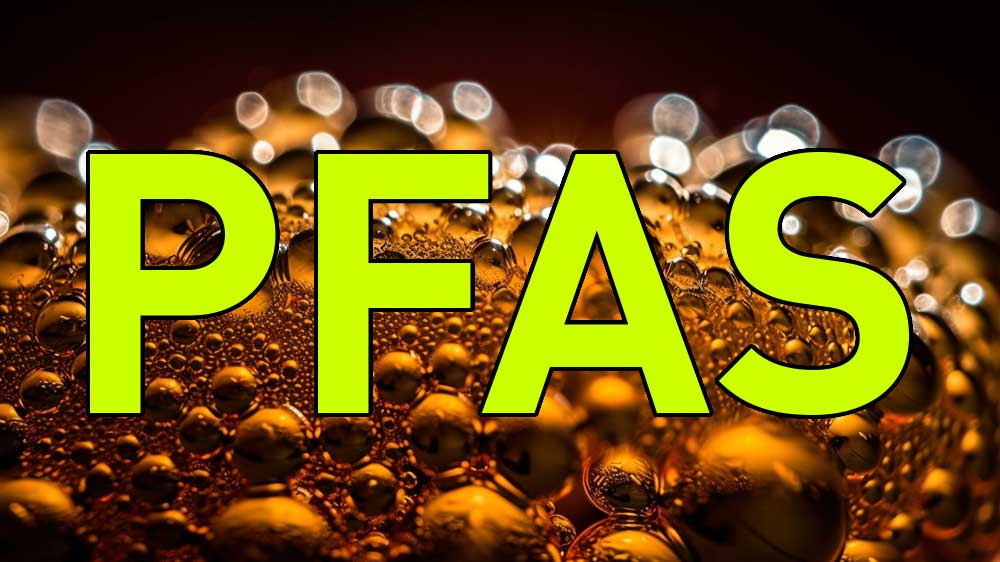PFAS (per- and polyfluoroalkyl substances) are chemical compounds that are known as “eternity chemicals” due to their exceptional stability and longevity.
These substances consist of carbon-fluorine bonds that are particularly resistant to degradation processes. This is why PFAS do not degrade in the environment or in the human body, but accumulate in water, soil, animals and humans.
Die Gruppe umfasst mehrere tausend synthetisch hergestellte Verbindungen, die oft auch als PFC (Per- und Polyfluorcarbone) bezeichnet werden.
PFAS are found in many everyday products, such as water-repellent textiles, cookware, food packaging and fire-fighting foam, as a non-stick coating on pans, waffle irons, baking pans, on grease-repellent fast food packaging such as pastry and chip cone bowls, in microwave popcorn packaging, for impregnating textiles and leather against moisture, oil and dirt. Their use poses a significant environmental and health risk as they accumulate over time in ecosystems and food chains. The chemical properties of PFAS make them useful in many industrial applications, but their negative effects are becoming increasingly apparent.
The health risks of PFAS are well documented.Long-term exposure to these substances can lead to serious illnesses such as liver damage, thyroid disease, obesity, fertility problems and cancer.
An impairment of the immune system has also been proven. In the EU and other regions, regulations have therefore been issued that restrict or ban the use of PFAS in products.
Diese Regelungen sollen den Kontakt mit PFAS verringern und ihre Verbreitung in der Umwelt minimieren.
One particularly well-known case of PFAS pollution is the ‘Dupont scandal’ in the USA, which was made famous by the film ‘Poisoned Truth’.
In this case, people were contaminated with PFAS due to the environmental damage caused by a chemical company, which led to health problems.
The scandal helped to raise public awareness of the dangers of PFAS and increase pressure on governments and companies to take action.
Another example of the problematic spread of PFAS took place in the district of Altötting in Bavaria. According to an article in the Süddeutsche Zeitung on 24 January 2023, conspicuous concentrations of PFOA (perfluorooctanoic acid), one of the best-known PFAS compounds, were found in blood donations from the municipality of Gemmerting in 2017. As a result, activated carbon filters were used to treat the drinking water. Investigations by the State Office for Health and Food Safety (LGL) in summer 2022 showed that the PFOA concentration in the blood of the affected test subjects was reduced by more than half within four years. Nevertheless, 280 out of 760 people tested still exceeded the so-called HBM II value of 10 µg/l blood plasma.
The persistence of PFAS in the environment is a key problem.These substances can remain in soil, water and living organisms for decades.Due to their persistent nature and the difficulties of degradation, they are increasingly regarded as a serious environmental hazard.
Am 7. Februar 2024 haben die Behörden der EU-Mitgliedsstaaten Deutschland, Niederlande, Dänemark, Norwegen und Schweden einen gemeinsamen Vorschlag zur Beschränkung von PFAS vorgestellt. Dieser umfasst strengere Maßnahmen, um die Verwendung dieser gefährlichen Substanzen zu regulieren und ihre Verbreitung zu stoppen. Es wird vorgeschlagen, alle Verwendungen von PFAS mit einer Übergangsfrist von 18 Monaten zu beschränken, um eine nachhaltige Reduzierung der Verbreitung dieser „Ewigkeits-Chemikalien“ zu erreichen.
Further information is available on the ECHA website:
https://echa.europa.eu/it/hot-topics/perfluoroalkyl-chemicals-pfas
